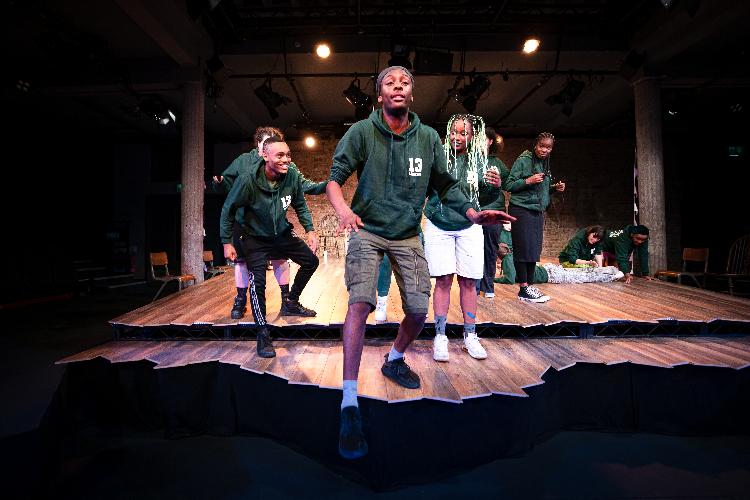As We Face The Sun, a new play written by Kit Withington and co-directed by Bush Young Company Director Katie Greenall and the theatre’s Artistic Director Lynette Linton, is a touching tale of teenagers at school experiencing the loss of a friend and learning to navigate the emotions that come with it, all while discovering how to become young adults themselves. Rooted in the present, where the now 25-year-olds find themselves at the annual party they hold to commemorate their friend, the plot is punctuated with memories of the event of her passing, as well as how its aftermath impacted aspects of their lives in following years.
As soon as the audience were taking their seats, the cast were immediately in character as cheeky teenagers, engaging personally and compellingly with audience members. This momentum was kept up throughout: injected with humour, vibrancy and a charming relatability, the production had a great energy about it and managed to embody the vitality of youth while steadfastly holding the audience’s attention.
Of course, switching between the past and the present in this play called for strong actors able to play both the excitable adolescent and the more mature, young adult version of their parts. These actors certainly delivered: the contrast between each character as their former teenage and latter adult self was never stark, but rather nuanced in each case, ensuring the character’s essence was maintained as they evolved as a person. It was evident that each actor had deeply considered their own character’s journey between their younger and older self. Standout performances included those of intuitive, empathetic Lorry (Coral Wylie), young parent misfit Whitney (Maymuna Abdi), passionate Evie plagued with misplaced guilt and depression (Sara Dawood), and comical but misunderstood spotlight-lover Michael (Jordan Haynes).
Some characters’ journeys were less apparent than others’ in the play itself, though, and you could find yourself wishing you knew more about some of those whose stories were less developed. Perhaps this could have been rectified with more monologues for those somewhat quieter characters, or even fewer characters to begin with.
Another well-thought-out way to note the age change between characters was the use of costume: the simple idea of removing hoodies when not schoolchildren eliminated any chance of confusion and looked highly effective. Complementing the simple set which consisted of just some chairs, posters and birthday props, this enabled a total focus on the cast’s performance, and meant the lighting and stage itself could really be used to captivate the audience in some scenes.
Using music from the 2010s to anchor the characters’ youth in this period while describing the very experiences this generation collectively had growing up, this play is certainly a trip down memory lane for today’s 20-30-year old viewers. However, the performance addresses themes all adults can understand: the effects of loss, the extent of change and growth of personalities as they make their way into young adulthood, and the sometimes painful twenty-something years, where suddenly memories might not be enough to keep a group of old friends at different life stages together anymore.
Tackling emotions as strong as anger, depression, guilt, anxiety and loneliness through grief is no easy task for a playwright, and yet the sincere, innocent, interjecting voices of inexperienced teenagers grappling with these feelings come across very convincingly in Withington’s sensitively written script. This, coupled with Greenall and Linton’s superb direction, seems to effortlessly yet vulnerably epitomise the human struggle to communicate what it is to lose someone.
Bush Young Companies, only started during the pandemic, have certainly created a special production here. These talented 18-25-year-olds have brought to life a poignant and refreshing piece of theatre, and it will be exciting to see where this group goes next, as they continue ‘moving, ticking, creeping forward’.
Review: Lucy Dyer Photo: Harry Elletson

